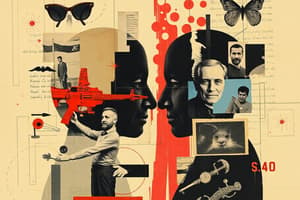Podcast
Questions and Answers
What are norms?
What are norms?
Socially accepted practices.
What are bundles of norms?
What are bundles of norms?
Roles
Define sociology.
Define sociology.
The study of how societies are organized and how that organization shapes people's beliefs and behaviors.
What is the Thomas Theorem?
What is the Thomas Theorem?
How do we know something is socially constructed?
How do we know something is socially constructed?
What did Marx believe about the formation of society?
What did Marx believe about the formation of society?
What is the difference between person blame and system blame?
What is the difference between person blame and system blame?
Define agency.
Define agency.
Is society structured?
Is society structured?
What time period did Marx live in?
What time period did Marx live in?
Define zero sum.
Define zero sum.
Define tragedy of the commons.
Define tragedy of the commons.
What did Max Weber believe?
What did Max Weber believe?
What was Marx's conflict theory?
What was Marx's conflict theory?
What did Durkheim believe about suicide?
What did Durkheim believe about suicide?
What is a functionalist perspective?
What is a functionalist perspective?
What can society be compared to from a functionalist point of view?
What can society be compared to from a functionalist point of view?
What is a peer group?
What is a peer group?
What shapes agency?
What shapes agency?
What did Weber believe about status?
What did Weber believe about status?
What is something important about status?
What is something important about status?
What are the different types of capital?
What are the different types of capital?
What is Habitus?
What is Habitus?
What was the five dollar day campaign?
What was the five dollar day campaign?
Define massification
Define massification
What are the characteristics of a consumer society?
What are the characteristics of a consumer society?
What is the current consumerism expression today?
What is the current consumerism expression today?
What is McDonaldization?
What is McDonaldization?
Flashcards
Norms
Norms
Socially accepted and expected behaviors within a society.
Roles
Roles
A set of norms associated with a specific position or function in society.
Institutions
Institutions
Established sets of roles and norms organized to achieve specific purposes in society.
Sociology
Sociology
Signup and view all the flashcards
Thomas Theorem
Thomas Theorem
Signup and view all the flashcards
Social Construct
Social Construct
Signup and view all the flashcards
Marx's view of Society
Marx's view of Society
Signup and view all the flashcards
Person Blame vs. System Blame
Person Blame vs. System Blame
Signup and view all the flashcards
Agency
Agency
Signup and view all the flashcards
Is Society Structured?
Is Society Structured?
Signup and view all the flashcards
Marx's Time Period
Marx's Time Period
Signup and view all the flashcards
Zero Sum
Zero Sum
Signup and view all the flashcards
Tragedy of the Commons
Tragedy of the Commons
Signup and view all the flashcards
Max Weber's Beliefs
Max Weber's Beliefs
Signup and view all the flashcards
Marx's Conflict Theory
Marx's Conflict Theory
Signup and view all the flashcards
Durkheim's View on Suicide
Durkheim's View on Suicide
Signup and view all the flashcards
Functionalist Perspective
Functionalist Perspective
Signup and view all the flashcards
Functionalist View of Society
Functionalist View of Society
Signup and view all the flashcards
Peer Group
Peer Group
Signup and view all the flashcards
What shapes agency?
What shapes agency?
Signup and view all the flashcards
Weber's Focus
Weber's Focus
Signup and view all the flashcards
About Status
About Status
Signup and view all the flashcards
Types of Capital
Types of Capital
Signup and view all the flashcards
Habitus
Habitus
Signup and view all the flashcards
Five Dollar Day Campaign
Five Dollar Day Campaign
Signup and view all the flashcards
Massification
Massification
Signup and view all the flashcards
Demassification
Demassification
Signup and view all the flashcards
Consumer Society traits
Consumer Society traits
Signup and view all the flashcards
Current consumerism expression
Current consumerism expression
Signup and view all the flashcards
McDonaldization
McDonaldization
Signup and view all the flashcards
Study Notes
- Norms are socially accepted practices.
- Roles are bundles of norms.
- Institutions are bundles of roles.
- Sociology is how societies are organized and how that organization shapes people’s beliefs and behaviors.
Thomas Theorem
- The Thomas Theorem states that what is believed to be real is real in its consequences.
- Religion is an example
Social Construction
- Something is socially constructed if it:
- Varies from culture to culture
- Changes over time
Marx's Beliefs
- Society was originally formed on interdependence due to necessity.
- Relationships have shifted to being more of a commodity than a matter of survival dependency.
Blame Types
- Person blame attributes circumstances to the individual.
- System blame attributes circumstances to the system in place.
Agency
- Agency is volition, free will, and the ability to act on one's own accord.
- Society is structured.
- Marx lived during the Industrial Revolution.
Zero Sum
- Zero sum refers to when there is a limited amount of something available.
Tragedy of the Commons
- Tragedy of the Commons describes how unfiltered access to something will cause overuse or ruin of that item.
Max Weber's Beliefs
- Max Weber focused on rationalization and dehumanization.
Marx's Conflict Theory
- People compete with each other for scarce resources, such as zero-sum resources or natural resources.
Durkheim's Beliefs
- Durkheim believed that suicide was socially constructed.
- Functionalism posits that everything has a function.
- Society can be compared to an organism from a functionalist point of view.
- A peer group is a bundle of roles.
- Structure shapes agency.
- Weber believed in status and power.
- Status is exclusive of class.
- It is power, and class can play a role
Capital Types
- Financial capital: exchangeable assets
- Social capital: connections
- Human capital: skills, knowledge, and expertise
- Cultural capital: comfort in various situations
Habitus
- Habitus: Things that come easily to an individual
- Allows easy connection with others
Five Dollar Day Campaign
- The Five Dollar Day Campaign enabled people to afford what they were producing.
- Massification is the mass production of a specific item, resulting in everyone having the same thing.
- Demassification is when everything is different.
Consumer Society Characteristics
- The characteristics of a consumer society include:
- Buying what one makes
- Acceptance of shopping
- Assumptions based on purchases
- Current consumerism expression: Pseudodemassification
- McDonaldization is predictable, efficient, and dehumanizing.
Studying That Suits You
Use AI to generate personalized quizzes and flashcards to suit your learning preferences.




